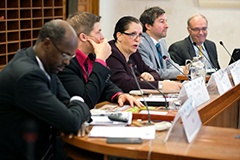The following blog story by IFPRI senior researcher Perrihan Al-Riffai and Nerina Muzurovic, Knowledge Management Officer at IFAD, was originally posted on the Arab Food Security Blog.
In a well-attended side event titled “Building Resilience to Crises in the Arab World” at the 41st meeting of the Committee on World Food Security (CFS) in Rome, October 17th, 2014, IFPRI in collaboration with its development partners, CGIAR’s Policies, Institutions and Markets Research Program, FAO’s Regional office for the Near East, IFAD/NEN and UN-ESCWA presented the results of recent studies on food security in the Arab Region and launched the Arab Food and Nutrition Security Blog.
In the Arab World, food insecurity is not only a consequence of conflict, it is also a major cause of civil conflict, more so in Arab countries than in the rest of the world. Recent events such as the food price riots in 2007-08 and the Arab uprisings in 2010-11 seem to confirm the role of food insecurity as a catalyst to political instability and civil conflict. In short, emphasized Mohamed Aw Dahir, the regional food systems economist at FAO’s Near East Region, “Peace is fundamental to food security, and food security is fundamental for keeping peace.”
Policies, programs, and projects that build resilience and improve food and nutrition security are likely to also reduce conflict was one of the key messages Olivier Ecker, research fellow at IFPRI, had during the session. Resilience-building policies and programs should focus on increasing the opportunity costs of conflict participation (through e.g. rural development, employment and income generation, social safety nets, human capital formation) and programs and projects that adopt a participatory, demand-driven approach and support social inclusion and cohesion (e.g. IFAD’s projects in Dhamar and Al-Dahla, Yemen) tend to be more successful in building resilience for food and nutrition security and conflict prevention.
Improving policies and interventions will require more and better information, as well as monitoring and evaluation, highlighted Khalida Bouzar, IFAD’s Director of the Near East, North Africa and Europe Division who also chaired the side event. Data availability as well as access to existing data across the Arab World is difficult leading to a limited scope for improving evidence-based decision making as well as the monitoring and evaluation of projects.
Regional interagency collaboration is emerging as a powerful mechanism to enhance institutional effectiveness and impact on the ground, including intergovernmental processes at regional and global levels. In order to improve the knowledge base for the Arab World, IFPRI, under the leadership of Clemens Breisinger, senior research fellow at IFPRI, in collaboration with development partners, IFAD, UN-ESCWA and CGIAR-PIM, helped build a knowledge platform for the Arab World known as Arab Spatial. “Arab Spatial, is the first open access interactive atlas and data repository for the Arab World”, explained Perrihan Al-Riffai, senior research analyst at IFPRI. The Arab Food and Nutrition Security Blog, co-financed by the IFAD grant on “Decreasing Vulnerability to Conflict in MENA through Rural Development” and chaired by Nadim Khouri, Deputy Executive Secretary of the UN-ESCWA aims to further inform the food and nutrition security debate through expert opinions and provide a platform to address them across the Arab World.
More regional collaboration is needed for the Arab World to build its resilience to crises. Emerging challenges, include; addressing conflicts and their regional spillover effects, trade policies, transportation and infrastructure, water and energy, research and development, and sustainable flows of direct foreign investment need to be addressed at the regional level. “Building resilience means helping people, communities, countries, and global institutions prevent, anticipate, prepare for, cope with, and recover from shocks and not only bounce back to where they were before the shocks occurred, but become even better-off.”







